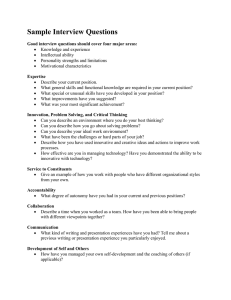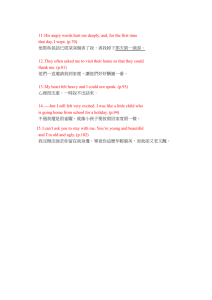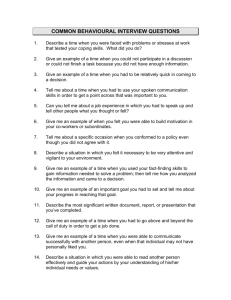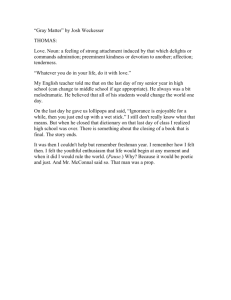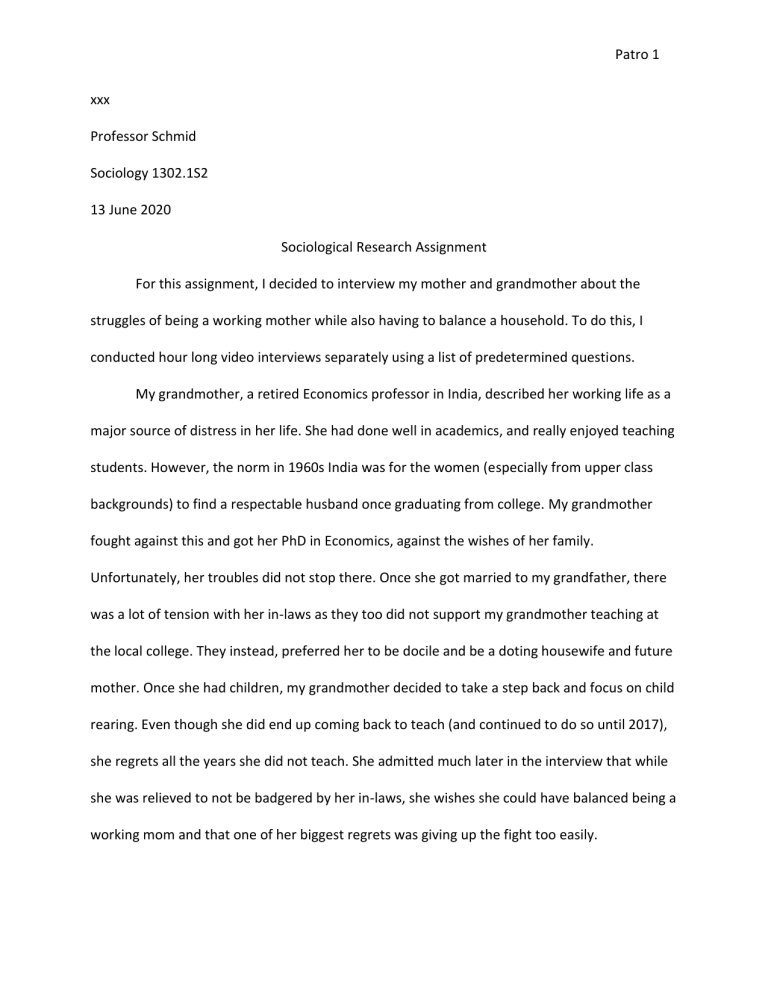
Patro 1 xxx Professor Schmid Sociology 1302.1S2 13 June 2020 Sociological Research Assignment For this assignment, I decided to interview my mother and grandmother about the struggles of being a working mother while also having to balance a household. To do this, I conducted hour long video interviews separately using a list of predetermined questions. My grandmother, a retired Economics professor in India, described her working life as a major source of distress in her life. She had done well in academics, and really enjoyed teaching students. However, the norm in 1960s India was for the women (especially from upper class backgrounds) to find a respectable husband once graduating from college. My grandmother fought against this and got her PhD in Economics, against the wishes of her family. Unfortunately, her troubles did not stop there. Once she got married to my grandfather, there was a lot of tension with her in-laws as they too did not support my grandmother teaching at the local college. They instead, preferred her to be docile and be a doting housewife and future mother. Once she had children, my grandmother decided to take a step back and focus on child rearing. Even though she did end up coming back to teach (and continued to do so until 2017), she regrets all the years she did not teach. She admitted much later in the interview that while she was relieved to not be badgered by her in-laws, she wishes she could have balanced being a working mom and that one of her biggest regrets was giving up the fight too easily. Patro 2 My mother, an OB-GYN, describes her working life as becoming more harmonious as the years pass by. Encouraged by my grandmother to excel in school, my mother was top of her class all the way through medical school. However, she suffered from sexist and demotivating comments from not only her male peers but also her professors! My mother had always wanted to do neuro surgery like her father, but because she was told constantly that she should go into more “easier specialties that are more suitable for a woman”, she felt that she had to give up her dream to do surgery and went the OB-GYN route. Though she did pick a specialty that she did not want initially, she worked hard to get certified and now does surgery for a spectrum of female issues. All this was made much easier with the support of my father. Unlike previous generations, my father did not feel the need to control my mother and instead encouraged her to pursue her career while he became a stay-home dad for a few years for my sister and I. The interview ended with my mother stating that my father was the biggest reason why she is able to work full time, volunteer with Doctors without Borders, give time to family, and also give back to the community too. Though I enjoyed learning and conducting these interviews, I know this was not an unbiased project. I decided to specifically use interviews, which is a form of a survey (OpenStax, 36). I decided on this particular research method because I felt I could get more in-depth answers than a typical survey format, and this was the quickest way to get my results from my two participants. Thankfully, I did not face any logistical concerns because I was able to do all digital and also was lucky enough to record both conversations on the phone so I could go back and refer to it. However, I did face some problems with validity, because I felt that both participants had matured from when they are discussing the time period in question. Thus, I felt Patro 3 the answers would have differed than if I had the ability to interview them in the aforementioned time period. There was also selection bias. I selected these two women because they were family members and I had quick access to them. So, I felt that created bias about the entire study. If I were to attend this research study a second time, I would change a few things. First, I would be more lax about my questions. Because I was using predetermined questions, I felt that the conversations didn’t flow as easily because I felt like I was listening for the answer to the question I asked but not so much anything else. Sociologist must be good listeners, and I felt that I was not one. To go off this, I also felt like I asked many leading questions. Thus, I felt that I had manipulated both women into certain answers. I would also like to avoid selection bias, and would prefer to select women from a wider pool of applicants. Overall, this was a great exercise for me to get into the right “mindset” for the course. Patro 4 Works Cited OpenStax, 2012, openstax.org/details/introduction-sociology-2e.
